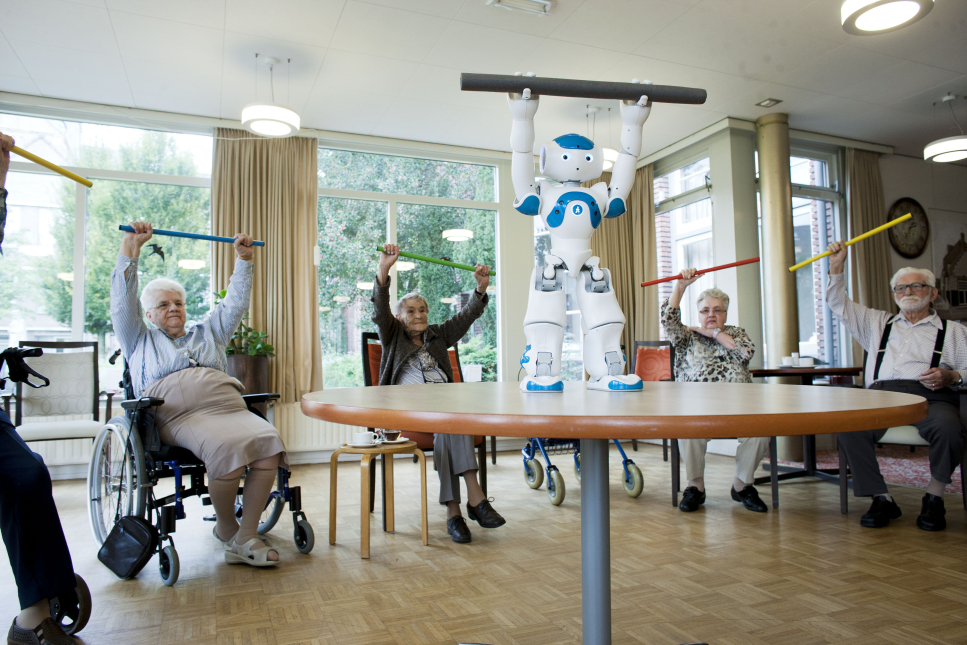Human rights in the robot age
Challenges arising from the use of robotics, artificial intelligence, and virtual and augmented reality
Report
Downloads

Smart devices surveilling our lives. Artificial intelligence technologies steering our behaviour. Care robots hindering human contact. Does this sound terrifying? Inevitable? It does not have to be. Time for a wakeupcall.
Smart devices surveilling our lives. Artificial intelligence technologies steering our behaviour. Care robots hindering human contact. Does this sound terrifying? Inevitable? It does not have to be. Time for a wakeupcall.
The report demonstrates that these technologies can have a positive or a negative impact on human rights. Regarding these rights, we focus on issues relating to the right to respect private life, human dignity, ownership, safety and liability, freedom of expression and the prohibition of discrimination as wellas access to justice and the right to a fair trial.
The Rathenau Instituut conducted this research on the invitation of the Committee on Culture, Science, Education and Media of the Parliamentary Assembly of the Council of Europe (PACE). Our research shows that the human rights framework forms a practical starting point for policy makers tasked with regulating robotics, artificial intelligence or similar technologies. However, in certain cases clarification on the rights is needed. We therefore argue in favour of two, novel, human rights: the right to not be measured, analysed or coached, and the right to meaningful human contact.
Preferred citation:
Van Est, R. & J.B.A. Gerritsen, with the assistance of L. Kool, Human rights in the robot age: Challenges arising from the use of robotics, artificial intelligence, and virtual and augmented reality – Expert report written for the Committee on Culture, Science, Education and Media of the Parliamentary Assembly of the Council of Europe (PACE), The Hague: Rathenau Instituut 2017
This list of recommendations may also function as an initial agenda for the preparation of a convention on robot ethics.
Right to the protection of personal data
We recommend that the Council of Europe takes a stance with regard to the ubiquitous and massive personal data processing of the modern era, reinforcing the human rights principles as enshrined in the Conventions.
Right to respect for private life
The Council of Europe could form an opinion about the psychological experiments involving humans taking place on the Internet and could clarify whether the firms that are doing these psychological experiments on the Internet should follow the ethics codes that currently apply when doing psychological experiments. The Council of Europe could form an opinion on whether and how persuasion software can be developed that respects people’s agency.
Right to respect for family life
The Council of Europe could form an opinion about how ICTs can be designed in such a way that they comply with the right to respect for family life.
Human dignity
The Council of Europe could provide guidelines on engineering techniques and methods that permit AI and robotics to fully respect the individual’s dignity and rights, allowing vulnerable groups such as the elderly to fully and effectively participate in society and live their lives in dignity.
The right to the peaceful enjoyment of possessions
The Council of Europe could provide guidance on ownership matters in the robot age, setting the boundaries within which someone may enjoy his or her (in)tangible possessions and how others have to respect those boundaries.
Safety, responsibility and liability
The Council of Europe could offer guidelines on how to apportion liability with regard to robotics.
The right to freedom of expression
The Council of Europe could provide clarification on the role of information gatekeepers, such as Google and Facebook, as news editors and their possible duties as public watchdogs. In addition, the Council of Europe could provide a blueprint as to how central information gatekeepers, such as Google and Facebook, could use their algorithmic powers for the benefit of human rights, especially in relation to the right to receive and impart information and ideas.
The prohibition of discrimination
The Council of Europe could shed light on how algorithmic accountability or fairness can be facilitated and how the developers of algorithms can be enabled to devise automated decisions that respect human rights and will not (unintentionally) discriminate against individuals.
Access to justice and the right to a fair trial
The Council of Europe could establish a framework of minimum norms to be taken into account when a court uses AI. This could prevent as far as possible situations in which individual contracting states devise their own frameworks, which risks offering varying degrees of protection in the sense of what is set out in article 6 ECHR.
The right to not be measured, analysed or coached
The Council of Europe could clarify to what extent in the context of the robot age the right to respect for privacy implies the right to not be measured, analysed or coached.
The right to meaningful human contact
The Council of Europe could clarify to what extent in the context of the robot age the right to respect for family life should also include the right to meaningful human contact.